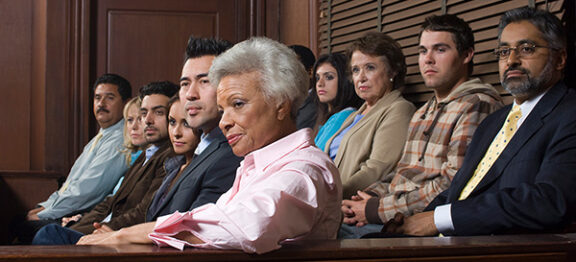
Brian T. Gravdal, Esq.
Just five minutes before the closing of the 2020 legislative session, the California legislature passed a law that could dramatically affect jury selection in both criminal and civil cases in the state. On September 30, 2020, California Governor Gavin Newsom signed the landmark piece of legislation into law.
AB 3070 increases transparency in jury selection by requiring an attorney exercising peremptory strikes to show clear and convincing evidence that his or her action is unrelated to that juror’s membership in a protected group or class. AB 3070 will take effect in criminal trials beginning on January 1, 2022, and in civil trials beginning on January 1, 2026.
In 1986 the United States Supreme Court held, in Batson v. Kentucky, that the state is not permitted to use its peremptory challenges to automatically exclude potential members of the jury because of their race. The Court stated: “The Equal Protection Clause guarantees the defendant that the state will not exclude members of his race from the jury venire on account of race or on the false assumption that members of his race as a group are not qualified to serve as jurors.” However sound and forward-leaning Batson’s principle and intent, recent evidence suggests that jurors of color (or other protected class members) are still being disproportionately excluded from juries. This evidence has prompted many lawyers, scholars and policymakers to question if the standards and procedures established by Batson are, by themselves, capable of effectively eliminating racial bias and discrimination in jury selection. Thus, the intent of AB 3070 is to expand upon federal precedent in the area of jury selection in both criminal and civil cases.
Under Batson and its progeny, the attorney challenging a juror peremptorily must offer a “neutral justification,” and the trial court must assess the rationale given to decide whether the opposing attorney has proven purposeful discrimination. But what is an acceptable “neutral” justification? To address this question, AB 3070 specifically identifies the following reasons for exclusion as presumptively invalid, due primarily to the frequency with which they have been offered in support of challenging jurors of color. Under the new law, as stated above, the presumption of invalidity can only then be overcome by clear and convincing evidence. The presumptively invalid reasons are these:
- Expressing a distrust of or having a negative experience with law enforcement or the criminal legal system.
- Expressing a belief that law enforcement officers engage in racial profiling or that criminal laws have been enforced in a discriminatory manner.
- Having a close relationship with people who have been stopped, arrested, or convicted of a crime.
- A prospective juror’s neighborhood.
- Having a child outside of marriage.
- Receiving state benefits.
- Not being a native English speaker.
- The ability to speak another language.
- Dress, attire, or personal appearance.
Going even further, and in an effort to combat implicit bias or “unconscious racism” (a term used by Justice Thurgood Marshall in his concurring opinion in Batson), AB 3070 replaces the “intentionality” requirement in California’s interpretation of Batson with an objective standard. Borrowing language from Washington’s General Rule 37, AB 3070 instructs judges to sustain objections against any challenge “if the court determines there is a substantial likelihood that an objectively reasonable person would view race, ethnicity, gender, gender identity, sexual orientation, national origin, or religious affiliation, or perceived membership in any of those groups, as a factor.”
The courtroom is a microcosm; prejudices and other social constructs do not evaporate at the courthouse steps. With respect to AB 3070, California’s Legislature was transparent about its intent, stating that “many of the reasons routinely advanced to justify the exclusion of jurors from protected groups are in fact associated with stereotypes about those groups or otherwise based on unlawful discrimination.”
The practical effects of AB 3070 on jury selection, and trials more generally, may be significant and far-reaching. The attorneys at Berman, Berman, Berman, Schneider & Lowary LLP will continue to monitor these developments and can address any questions you have regarding the above. They are uniquely qualified to provide additional insight and guidance.
To read the full text of the Assembly Bill, click HERE.
